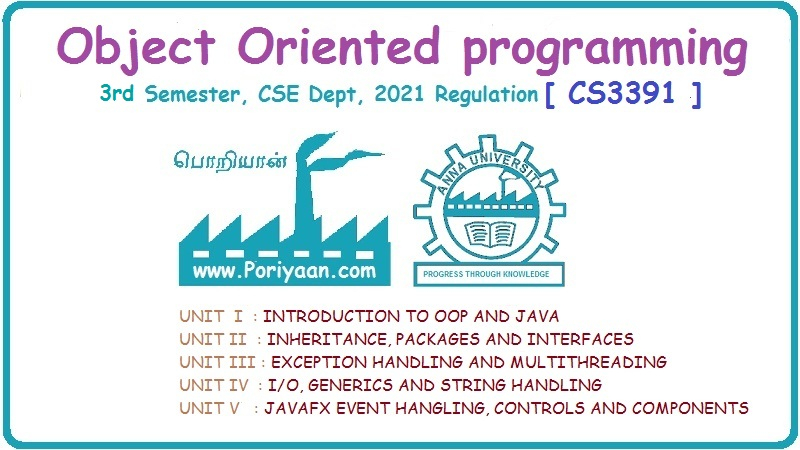Object Oriented Programming: Unit II: Inheritance, Packages and Interfaces
Implementing Interface
with Example Java Programs
It is necessary to create a class for every interface.The class must be defined in the following form while using the interface
Implementing Interface
• It is
necessary to create a class for every interface.
• The
class must be defined in the following form while using the interface
class
Class_name extends superclass_name
implements
interface_name1,interface_name2,...
{
//body
of class
}
• Let us
learn how to use interface for a class baland you dont
Step 1: Write following code and
save it as my_interface.java
public
interface my_interface
{
void
my_method(int val);
}
Do not
compile this program. Simply save it.
Step 2: Write following code in
another file and save it using InterfaceDemo.java
Java Program[Interface Demo.java]
class A
implements my_interface
{
public
void my_method(int i)
{
System.out.println("\n
The value in the class A: "+i);
}
public
void another_method() //Defining another method not declared in interface
{
System.out.println("\nThis
is another method in class A");
}
}
class
Interface Demo
{
public
static void main(String args[])
{
my_interface
obj=new A();
//or A
obj=new A() is also allowed
A
obj1=new A();
obj.my_method(100);
obj1.another_method();
}
}
Step 3: Compile the program created
in step 2 and get the following output
F:\test>javac
InterfaceDemo.java
F:\test>java
InterfaceDemo
The
value in the class A: 100
This is
another method in class A
Program
Explanation:
In above
program, the interface my_interface declares only one method i.e. my_method.
This method can be defined by class A. There is another method which is defined
in class A and that is another_method. Note that this method is not declared in
the interface my_interface. That means, a class can define any additional method
which is not declared in the interface.
Various
ways of interface implementation
• The
design various ways by which the interface can be implemented by the class is
represented by following Fig. 2.17.1.


• The
variables can be assigned with some values within the interface. They are
implicitly final and static. Even if you do not specify the variables as final
and static they are assumed to be final and static.
• Interface
variables are static because Java interfaces cannot be instantiated. Hence the
value of the variable must be assigned in a static context in which no instance
exists. The final modifier indicates that the value assigned to the interface
variable is a true constant that cannot be re-assigned by program code.
Review
Question
1.What
is an interface? Write a Java program to illustrate the use of interface. Give
self explanatory comments in your program. AU: Dec.-14, Marks 8
Object Oriented Programming: Unit II: Inheritance, Packages and Interfaces : Tag: : with Example Java Programs - Implementing Interface
Related Topics
Related Subjects
Object Oriented Programming
CS3391 3rd Semester CSE Dept | 2021 Regulation | 3rd Semester CSE Dept 2021 Regulation
